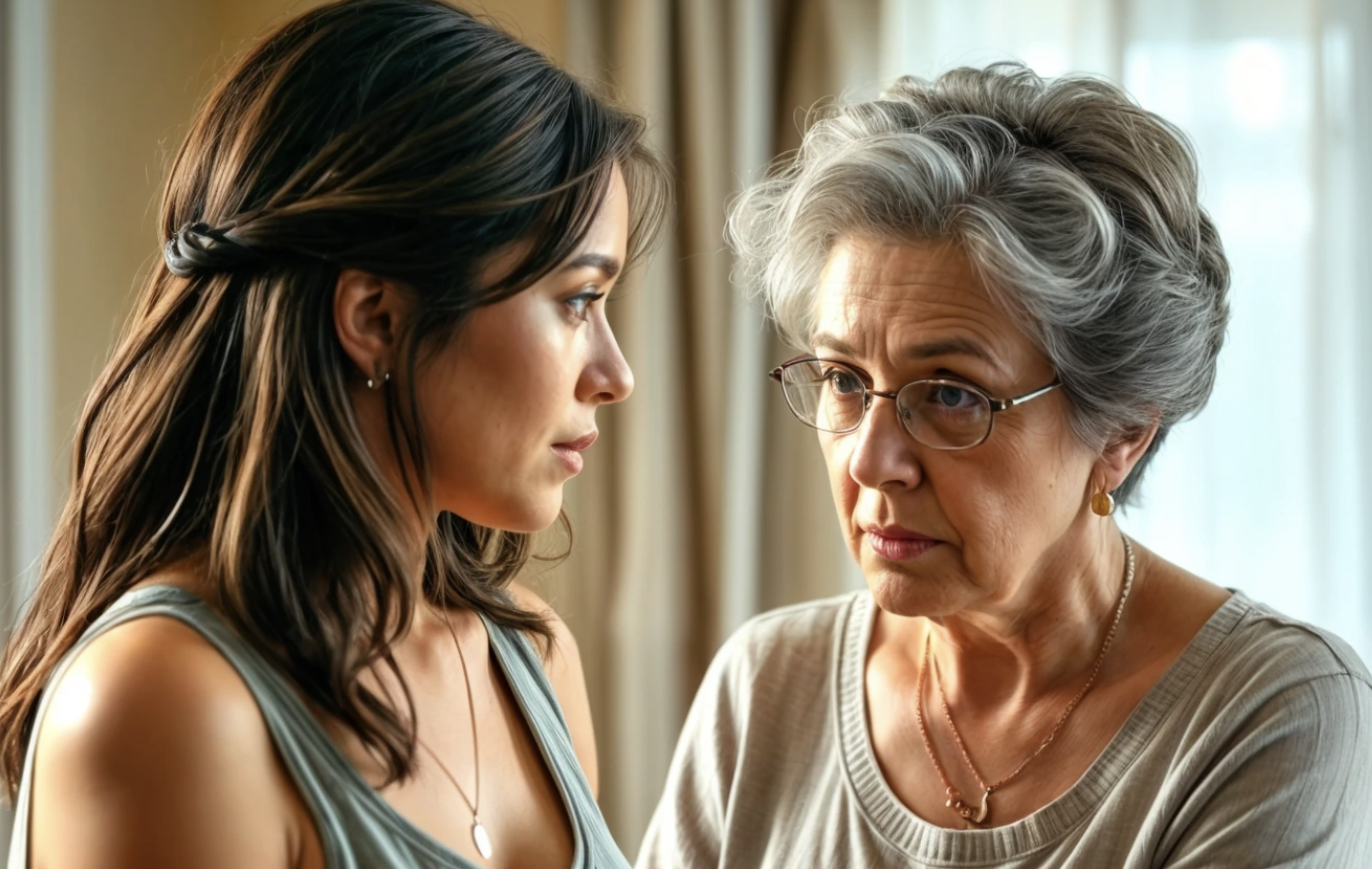“Mishenka, son, pass me that shrimp salad,” Svetlana Borisovna sang out to her son with the kind of tone as if he had just returned from a battlefield, victorious over an entire army. Her voice was soft, almost melodic, but behind it hid not just a request — it was a command no one dared to refuse.
Misha, my husband, immediately jumped up from the table, sharply sliding his chair back so its legs scraped unpleasantly against the floor. He hurried around the table, blocking me from the other guests as if I might interfere with his role as the devoted son. I shifted a little in my seat, pretending to be engrossed in my cup of fruit juice, though in reality, I was watching the scene with cold irony that I had long learned to keep inside.
This scene repeated itself again and again at every family gathering for about a year. The same ritual each time: Misha — hero, savior, pillar of the family. And me — just a woman standing slightly aside, a convenient accessory whose duty was to pour drinks, smile at jokes that were not funny, and keep silent when needed.
Svetlana Borisovna took the salad bowl from her son’s hands with such dignity as if she were receiving a trophy after long months of difficult negotiations or harsh trials. She placed the dish in the center of the table like a queen who had just crowned herself.
“A real man, the pillar of the family!” she loudly proclaimed, looking around at all the gathered relatives. “Not like some who only know how to flirt. Everything’s on his shoulders, he carries it all.”
I pretended to adjust the napkin on my lap to hide my facial expression. “His shoulders” meant my money — the very money I secretly used to plug the hole in her failing business. Three million rubles — an amount that still made Misha’s hands tremble when we transferred the last installment.
“Let them think it’s me,” he said then. “It’ll be easier for Mom to accept. You know her views about a woman breadwinner.”
Yes, I knew. And I agreed. What difference did it make who got the medals if the family was saved from shame and debt collectors? Back then, I thought it didn’t matter.
“Alina, why are you frozen?” my mother-in-law’s voice pulled me from my thoughts. “Uncle Vitya’s plate is empty. Put some meat for him.”
I silently took his plate. Uncle Vitya smiled sheepishly, but no one ever dared argue with Svetlana Borisovna.
While I served the hot dish, she continued her monologue, seemingly addressed to everyone but aimed at me.
“I look at you young people and marvel. My Misha works tirelessly, spinning like a squirrel in a wheel. And all for what? So there’s prosperity in the house. So the wife lacks nothing.”
She paused, letting the words sink into the guests’ minds.
“And what’s the return? Where’s the support? When I was his age, I worked, ran the house, and already had children. And now? They sit on men’s necks and give nothing in return.”
I put the plate in front of Uncle Vitya. My hands trembled slightly, but I forced myself to smile. Misha caught my gaze, and something like an apology flickered in his eyes. But he stayed silent. As always.
The evening rolled along the well-worn path. Praises for Misha alternated with veiled reproaches towards me disguised as “life wisdom.” I felt like an exhibit under glass that everyone was scrutinizing and judging.
When it came to dessert, I went to the kitchen to get the cake. Misha followed me.
“Lin, don’t be upset,” he whispered, closing the door. “Mom is just… well, she’s so happy for me. That I saved her.”
“I’m not upset, Mish. I understand everything.”
But I didn’t understand anymore. This game of the modest wife beside the “hero husband” was starting to suffocate me.
My app development startup, which everyone considered a “cute hobby,” earned three times more than his department head salary. I insisted we hide my income. To avoid making anyone jealous, to not provoke envy. So Misha would feel comfortable.
He felt comfortable. But I didn’t anymore.
I returned to the living room with the cake. Svetlana Borisovna was just complaining to a cousin about prices.
“…and tell me, how is a young family supposed to save for all this? No way! Unless the husband has a brain on his shoulders. And if beside him there’s not a helper but a budget hole, then that’s it, all’s lost.”
I began slicing the cake.
Then someone from distant relatives asked:
“Svet, why aren’t your people going to the sea this year? Misha worked so hard.”
Svetlana Borisovna pursed her lips and shot me a scorching glance, as if I had canceled the trip.
And then she said slowly and venomously, so everyone could hear:
“What sea? He needs to rest from the eternal burden. You’re a burden, not a wife,” she threw at me across the table. “You only know how to sit on someone else’s dime.”
The knife in my hand froze. An awkward pause settled, broken only by Uncle Vitya coughing into his fist. All eyes turned to me. Waiting for a reaction. An outburst, tears, a rude comeback.
I slowly lowered the knife onto the plate. Looked up at my mother-in-law and smiled. Not faltering, not showing a trace of humiliation. Just an empty, cold smile.
“What piece for you, Svetlana Borisovna? With nuts or without?”
She clearly didn’t expect that. She was flustered, blinked.
And without waiting for an answer, I cut her the biggest and most beautiful piece and placed the plate before her. Then calmly continued serving the cake to the others as if nothing had happened.
The evening ended quickly. The guests, sensing the tension, retreated one by one. In the car, Misha turned on a familiar song.
“Lin, Mom went too far, it happens to everyone. You know her temper…”
“I know,” I answered flatly, looking out the window at the passing city lights. My voice sounded foreign and lifeless.
“She doesn’t mean it. She just worries about me. That I get so tired.”
“Yes, sure,” I nodded. “Worries.”
There was no anger or remorse in his voice. Only tired irritation that he had to be a buffer between two women again.
And not a gram of understanding of what really happened. He didn’t see the insult. He only saw Mom’s “character trait.”
The next few days passed in oppressive silence. We barely spoke.
I immersed myself in work, signing a new contract with foreign investors. Misha wandered the house like a shadow, offended by my silence.
Then the phone rang. Of course, it was Svetlana Borisovna. Misha spoke with her on the kitchen for a long time, then came into the room where I was working on my laptop.
“Lin, here’s the thing…” he began uncertainly.
I took off my glasses and looked at him.
“Mom’s car is completely falling apart. Can you imagine, she almost got into an accident today. She says the brakes failed.”
I stayed silent, waiting for more. It didn’t take long.
“So, I thought… We can help her. Buy a new one. Not the most expensive, of course, but reliable. So we don’t have to worry.”
He looked at me hopefully. With the same hope he had when he asked for help paying off her debts. Confident I would understand and agree again.
“We?” I clarified, slowly closing the laptop.
“Yes, we. I can’t manage alone, you know. But together…”
“No, Misha,” I said quietly, but loud enough for him to hear every word. “We can’t.”
He froze.
“What do you mean? Alina, that’s my mom!”
“She’s your mom. Exactly. So you’ll buy her the car. With your salary.”
Misha looked at me as if I spoke an unknown language. Confusion mixed with anger in his eyes.
“Are you kidding? Because of what she said to you? Kindergarten, Lin! I thought you were above that!”
“I am above that, Misha. So much above that I won’t let anyone wipe their feet on me anymore. Neither her, nor you. The bank is closed. The ‘Save the Family’ project funding is terminated.”
He grabbed his phone and rushed to the balcony, gesturing furiously. I heard fragments of phrases: “…completely lost it!”, “…over some nonsense!”, “…yes, come, of course!”. I didn’t move. I waited.
Svetlana Borisovna stormed in forty minutes later. She burst into the apartment without knocking, ready for battle. Misha followed her like a squire.
“What’s going on here?” she demanded at the doorway. “Alina, why are you pushing my son? He’s sick because of you!”
I slowly turned to her.
“Hello, Svetlana Borisovna. I’m not pushing anyone. I just refused to buy you a new car.”
“What?!” She looked at Misha, then back at me. “You refused to help the family? After all my son does for you?”
That was the moment. The stage was set, the main actors assembled.
“And what exactly does your son do for me?” I asked calmly, looking her straight in the eyes. “He didn’t even cover your business debts for three million rubles last year.”
Mother-in-law froze with her mouth open. Misha turned pale as a sheet.
“What are you talking about? What debts? Misha paid everything! He told me himself! He saved me!”
“Misha?” I shifted my gaze to my husband, who was pressed against the wall. “Misha, tell Mom where you, a department head with a salary of a hundred thousand, suddenly got three million from? Did you rob a bank? Or find a treasure?”
He remained silent, unable to raise his eyes.
“I’ll tell you where,” I continued, my voice gaining strength. “That money is mine. Every penny.”
Earned by my “cute hobby,” as you like to say. My IT company, which you consider a trifle.
I paid for your mistakes to save your family from disgrace. And in return, I got the label of ‘burden.’
Svetlana Borisovna slowly sank onto the ottoman in the hallway. The mask of the heroic mother slid off her face, revealing confusion and humiliation.
She looked from me to her son-hero, who turned out to be a liar.
“I agreed to this lie for Misha’s sake. To not hurt his pride. So he would remain a hero to you. I thought it was right. But I was wrong.”
I grabbed my laptop bag from the chair.
“So, Svetlana Borisovna. Your son will buy you a car. If he can. Or you will. Learn to solve your problems without my wallet.”
I headed to the door, Misha stepped toward me.
“Lin… wait…”
“No,” I stopped at the threshold. “I’ve had enough. I was convenient to you for too long. It’s time to be happy for myself.”
And I left, closing the door behind me. I didn’t know where I was going. But for the first time in a long time, I felt I was going in the right direction.
Six months passed.
I stood in the middle of my new apartment — bright, spacious, with huge windows overlooking the city’s business center.
Sunlight danced on the parquet floor, the air smelled of fresh paint and coffee. Every detail in this space was mine: from the minimalist sofa to the abstract painting I bought at my first auction ever.
After that last scene, I rented a hotel room, and a week later, leased this apartment. The divorce went surprisingly smoothly.
Misha didn’t argue. It was as if they had taken the spine out of him.
He was broken, but not by my leaving, rather by the exposure. His carefully built hero image crumbled to dust.
The phone on the kitchen island buzzed. A message from Misha. They came once a week, like clockwork. At first angry tirades, then pitiful pleas, now something in between.
“Lin, I understand everything. I was wrong. But maybe we can at least talk? Mom is very sick, she cries constantly. Her blood pressure is high. She blames herself. And me. We both feel terrible without you.”
I set the phone aside without replying. I knew Svetlana Borisovna was not sick. Uncle Vitya, the only relative who called me after that evening just to ask how I was, occasionally reported the situation.
Mother-in-law did not cry — she was angry. Angry at her son who failed her hopes, at me who dared to air the family’s dirty laundry, at the whole world that was unfair to her.
They never bought her a car. Now they lived together in her apartment, and according to Uncle Vitya, the atmosphere there was gloomy.
Constant reproaches, money fights, mutual accusations. The hero and his saved mother turned out to be just two miserable people unable to care for themselves, let alone each other.
He never understood the main thing. He wrote that they felt “bad without me,” but not because they missed me as a person.
They felt bad without my money, without my support, without that invisible force that kept their world afloat while they sang praises to themselves.
Meanwhile, my business took off. The contract with the foreigners brought not only money but also recognition in narrow circles.
I hired five more developers, we rented a fancy loft for the office. I worked a lot, but this work brought me joy, not dull irritation.
I no longer hid my successes, no longer pretended it was a “cute hobby.” I was the owner of a thriving company, and that was my greatest achievement.
Another call came. This time — from my deputy.
“Alina Igorevna, the investors confirmed a meeting in China. In two weeks. They want to celebrate the launch in person. Should I book the tickets?”
I looked out the window. At the city lying at my feet. At the sky, clear and boundless.
“Yes, Kirill,” I replied, smiling. “Book them. And reserve me a hotel with a sea view. It’s time to finally rest.”



